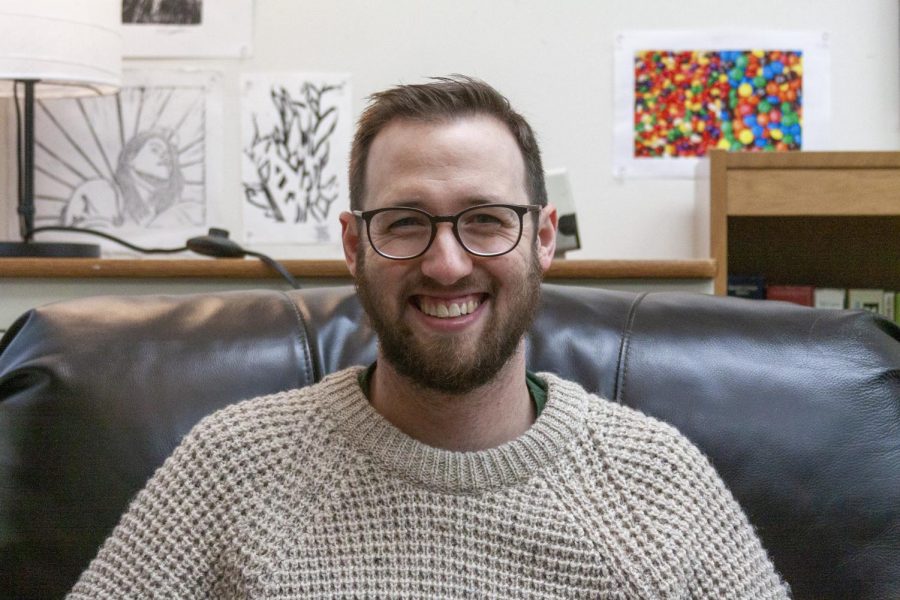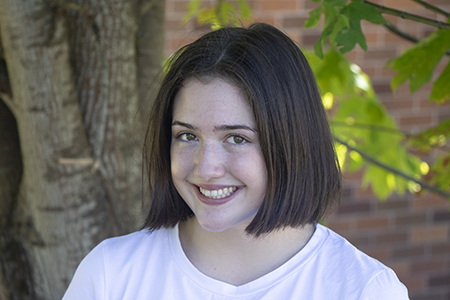English Teacher Mr. Larson Talks Literature, Technology, and Today’s Youth
English teacher Mr. Gregory Larson said that when he was a high schooler he “just wanted to be liked.”
April 8, 2020
Circa 2007, a young Mr. Gregory Larson was just like lots of other kids his age, seeking validation from peers and trying to discover his identity.
Through his four years as a student at La Salle, Mr. Larson had tried on the athletic status, the chemistry wiz persona, and the uncertainty of floating between friend groups.
Before he got into reading, when Mr. Larson faced obstacles in his life, he would often avoid searching for a solution. “Maybe I wouldn’t deal with the problem,” he said. “I’d just do something to feel good.”
Mr. Larson was an academic standout, priding himself on his impressive inventory of AP and Honors English courses.
“I didn’t know what job I wanted to have, and it seemed like studying English would give me an interesting life,” Mr. Larson said. “All my English teachers were all strange people, but in really good ways.”
Through his successes and privilege, Mr. Larson still grappled with one inconvenience: how would he get people to like him?
“Before that year, I just wanted to be liked. You know, like anyone, so I was floating between friend groups and looking for an identity,” Mr. Larson said.
Towards the end of his senior year, Mr. Larson recalled that when he started reading more, it helped him with the problems he was struggling with.
As a result of immersing himself into literature, his quality of life began to shift in a positive way. Mr. Larson was perceived by his peers as someone to turn to when life got tough.
As Mr. Larson embraced his newfound identity as the confidant among his peers, he found that literature was the answer to the multitude of problems his classmates were enduring. “In response to the problems I had, I could test the experience of characters in literature against what I did,” he said.
Because of Mr. Larson’s reputation as someone to trust, people started coming to him, seeking advice regarding the issues they were facing. “People seemed to be putting a lot of trust in me,” he said. “One of the things that helped was reading because I could give an answer that they can’t find on the internet.”
During high school, literature started to give Mr. Larson a new sense of who he was. “It wasn’t like everyone knew me for this, but it was the first time I started to feel like I had an identity that was my own, more than like, I’m on the basketball team,” he said.
In college, Mr. Larson became infatuated with a book called “Invisible Man” by Ralph Ellison. He described this read as an opportunity for him to step out of his own skin, his own biases, and see perspectives he could not see before reading this book.
“I experienced things that I cannot experience because of how I look. Because of my background, you know, I grew up really privileged, and white. When I read that book, [the narrator] is not really privileged and not white,” Mr. Larson said. “That character story is really powerful and it changed the way that I think about race.”
Flashforward to present day, where Mr. Larson spends his days as an English teacher at La Salle, equipping his students with the skills they will need to thrive in life beyond the classroom.
Mr. Larson asserts that literature tackles the question of how to be a good person and how to navigate the world. “There are books about all sorts of things, all these creative people give me access to their thoughts, and I like exploring what other people think,” he said.
As an educator, his goals are to introduce students to better versions of themselves by asking them to do challenging work that can result in positive change.
“I want my class to help students develop tools to better understand themselves and others,” Mr. Larson said. “I want my class to ensure that they are able to communicate that understanding effectively. So I want them to read well in service of understanding the world around them.”
Mr. Larson wishes that goal setting, both short and medium term, was more of a commonality among high school students. “That [goal setting] is really useful when you are faced with 100 different decisions every day,” he said. “If I know my goals, now I can see this decision as supporting or not supporting my goals. Reading helped me [with all of those things]. It’s one of the most powerful tools for helping me be the person I want to be, the person I hope to be.”
A staple of Mr. Larson’s English 1 class is the technology unit. This unit focuses on helping adolescents address their relationship with technology and how the people that design technology think. He hopes not to tell students what to think about technology, but to teach them about how technology works.
“YouTube is an incredible resource. You can learn a lot there,” he said. “But there are ways that intake of literature happens that are very powerful for learning and I don’t want to lose them.”
Mr. Larson acknowledged how it is a very difficult time to be a young person in today’s society. He said that his students are pulled in so many directions, all the time. “All of those directions feel important, and they feel like they have to be moving toward something all the time and not enough time is spent,” he said.
A worry of Mr. Larson’s is the way that interpersonal interaction is changing. “I think that has shifted in major ways [due to technology],” Mr. Larson said. “I think that it’s certainly changing what it means to be a young person.”
Technology in the youth’s hands worries Mr. Larson because it allows things to get done very quickly. “Some things you really can’t do quickly,” he said. “So I’m watching expectations for time shift in a pretty big way.”






Brooklyn Chillemi • Apr 9, 2020 at 1:20 am
I LOVED being a student in Mr. Larson’s class. I’m so glad The Falconer got to feature him! 🙂